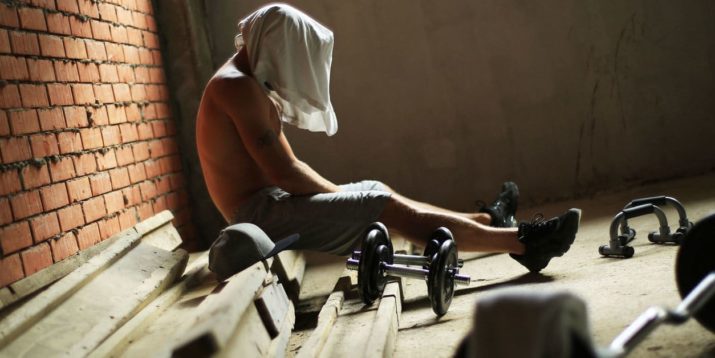Are You Overtraining? These 7 Symptoms Will Surprise You

You probably recognize the obvious signs of overtraining, including continuous muscle soreness and chronic injury. But there are several other signs and symptoms of overtraining that are somewhat sneaky and subjective — of course, they could be other things too. You won’t know for sure until you put it all together.
Why Overtraining Happens
Clifford Stark, D.O., Medical Director of Sports Medicine at Chelsea and Director of Northshore LIJ Plainview Sports Medicine Fellowship, is quick to point out that there’s no medical consensus on why overtraining happens. “There are certain symptoms that identify overtraining, but no one really knows where it comes from.” Some hypotheses even conflict with one another.
Overtraining isn’t entirely a physical phenomenon. You might be overloading your muscles, joints, and nervous system excessively. However, you might also be accumulating psychological stress from doing too much and not taking time off to make sure you’re fully recovered by your next workout.
Overtraining can be dangerous and it can also be sabotaging the hard work you’re putting into your fitness regime. We’ve rounded up seven lesser-known signs of overtraining you should be looking out for if you’re going hard in your workouts.
7 Possible Signs of Overtraining
Unquenchable Thirst
Sure, you’re thirsty when you’re working out, but are you still thirsty long afterward? If so, it might be due to overtraining. “Your body might be in a catabolic state — that means breaking down tissue — and sometimes we don’t even know why that’s happening,” says Stark. That breakdown of tissue places more demand on your body overall, which includes a greater need for hydration.
One of the most effective ways to halt this breakdown is by consuming a combination of carbohydrates and protein (found in products like Beachbody Performance Recover) during the first 30 to 60 minutes following exercise.
Insomnia
Having trouble falling or staying asleep? Insomnia can impact anyone, but if you fear you’re training too hard and you’re having trouble sleeping, you might have your answer. “It’s not energy where you can stay up and do things; it’s not that wonderful feeling of fatigue when you can fall right asleep,” says Dr. Stark. “It’s neither.”
Low Sex Drive
You should feel like a sexual tyrannosaurus after a good workout, right? Maybe not, especially if you’ve entered a catabolic state owed to overtraining. Dr. Stark likens it to studying for an exam: “You can get diminishing returns; it becomes counterproductive to work out.” This describes overtraining in general, but when it comes to your sex drive, “enjoyment of anything is going to be thrown off if you’re in a catabolic state.”
Frequent Illness
A good workout helps elevate your immune system. However, too much working out, or working out too hard, can lead to a suppressed immune response and more frequent illness. This again can relate to the catabolic state, but it might have another, more complex answer related to something called cytokines, which your body is either producing too many of or not enough. Regardless of the cause, Dr. Stark says, “It certainly makes sense that when you’re in a state of oxidative stress that it’s not going to be able to fight infections as well.”
Headaches
If you’ve never had trouble with headaches in the past, but all of a sudden you’re experiencing minor headaches or even migraines, overtraining might be the culprit. Dr. Stark says that many times this is a secondary symptom related to a suppressed immune system, dehydration, a lack of focus, or depression.
Changes in Personality
Depression is a widely recognized sign of overtraining. Lesser known is that any wild personality changes can be among the symptoms of overtraining. You might feel irritable or depressed, or suddenly find that you have difficulty focusing. Dr. Stark points out that there can be cyclical, self-reinforcing aspects to many of these symptoms. “You can’t sleep, you’re getting frequently ill and injured, you’re not able to perform at the gym — the harder you try, the worse you do, you’re less productive at work, you can’t concentrate.” All of that can lead to personality changes.
Fitness Plateaus
If you’ve plateaued, the answer might be to back off a bit, not to go even harder. Muscle tears are a big part of getting bigger. Overtraining, however, can mean that you’re just tearing them open again and again. Remember: Muscle growth happens during rest, not during training. Dr. Stark says this is one of the early signs of overtraining.
What To Do If You’re Overtraining
There are two ways to deal with overtraining. First and foremost, you need to train less and consider taking a week off altogether. Get out, have a walk, and do a bit of yoga, but avoid your usual training routine to figure out how you’re going to retool things.
Dr. Stark also suggests that it might be time to do something different when you get back to it. “Avoid doing the same thing over and over again,” he says, adding, “If people are trying to just get themselves in shape and they’re not varying things, they’re just doing the same things over and over in an obsessive fashion, they need to start varying things.”
Add to that proper nutrition, hydration, and rest, and you’ll be back in the game in no time.
